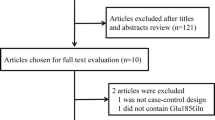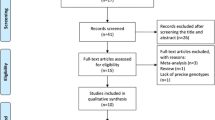Abstract
X-ray cross complementing group 1 (XRCC1) polymorphisms and bladder cancer risk has been investigated for years, but the result in Asian population is till inconclusive. Thus, we performed this meta-analysis to determine the association of XRCC1 Arg194Trp, Arg280His, and Arg399Gln polymorphisms with bladder cancer risk in the Asian population. PubMed, EMBASE, and China National Knowledge Infrastructure were searched up to January 2013 to identify eligible studies. The association strength was measured with odd ratios (ORs) and 95 % confidence intervals (95 % CIs). A total of nine eligible studies, including 1,931 bladder cancer patients and 2,192 controls, were identified. Significant increased risk of bladder cancer was observed for Arg194Trp polymorphism (allele comparison OR = 1.20, 95 % CI: 1.06–1.36, Pheterogeneity = 0.11; dominant model OR = 1.20, 95 % CI: 1.02–1.41, Pheterogeneity = 0.37) and Arg280His polymorphism (heterozygote comparison OR = 1.87, 95 % CI: 1.21–2.90, Pheterogeneity = 0.01; dominant model OR = 1.75, 95 % CI: 1.05–2.90, Pheterogeneity = 0.01); however, Arg399Gln was not associated with susceptibility to bladder cancer. No evidence of publication bias was detected. Our meta-analysis results suggest that XRCC1 Arg194Trp and Arg280His polymorphisms are associated with significantly increased risk of bladder cancer in Asians.




Similar content being viewed by others
References
Siegel R, Naishadham D, Jemal A. Cancer statistics, 2012. CA Cancer J Clin. 2012;62:10–29.
Yang L, Parkin DM, Li LD, Chen YD, Bray F. Estimation and projection of the national profile of cancer mortality in China: 1991–2005. Br J Cancer. 2004;90:2157–66.
Murta-Nascimento C, Schmitz-Drager BJ, Zeegers MP, Steineck G, Kogevinas M, et al. Epidemiology of urinary bladder cancer: from tumor development to patient’s death. World J Urol. 2007;25:285–95.
Bosetti C, Pira E, La Vecchia C. Bladder cancer risk in painters: a review of the epidemiological evidence, 1989–2004. Cancer Causes Control. 2005;16:997–1008.
de Laat WL, Jaspers NG, Hoeijmakers JH. Molecular mechanism of nucleotide excision repair. Genes Dev. 1999;13:768–85.
Shields PG, Harris CC. Molecular epidemiology and the genetics of environmental cancer. JAMA. 1991;266:681–7.
Garcia-Closas M, Egan KM, Newcomb PA, Brinton LA, Titus-Ernstoff L, et al. Polymorphisms in DNA double-strand break repair genes and risk of breast cancer: two population-based studies in USA and Poland, and meta-analyses. Hum Genet. 2006;119:376–88.
Manuguerra M, Saletta F, Karagas MR, Berwick M, Veglia F, et al. XRCC3 and XPD/ERCC2 single nucleotide polymorphisms and the risk of cancer: a HuGE review. Am J Epidemiol. 2006;164:297–302.
Lao T, Gu W, Huang Q. A meta-analysis on XRCC1 R399Q and R194W polymorphisms, smoking, and bladder cancer risk. Mutagenesis. 2008;23:523–32.
Wang C, Sun Y, Han R. XRCC1 genetic polymorphisms and bladder cancer susceptibility: a meta-analysis. Urology. 2008;72:869–72.
Arizono K, Osada Y, Kuroda Y. DNA repair gene hOGG1 codon 326 and XRCC1 codon 399 polymorphisms and bladder cancer risk in a Japanese population. Jpn J Clin Oncol. 2008;38:186–91.
Mittal RD, Mandal RK, Gangwar R. Base excision repair pathway genes polymorphism in prostate and bladder cancer risk in North Indian population. Mech Ageing Dev. 2012;133:127–32.
Wang M, Qin C, Zhu J, Yuan L, Fu G, et al. Genetic variants of XRCC1, APE1, and ADPRT genes and risk of bladder cancer. DNA Cell Biol. 2010;29:303–11.
Zhi Y, Yu J, Liu Y, Wei Q, Yuan F, et al. Interaction between polymorphisms of DNA repair genes significantly modulated bladder cancer risk. Int J Med Sci. 2012;9:498–505.
Huang J, Zhang J, Zhao Y, Liao B, Liu J, et al. The Arg194Trp polymorphism in the XRCC1 gene and cancer risk in Chinese mainland population: a meta-analysis. Mol Biol Rep. 2011;38:4565–73.
Qiu MT, Hu JW, Ding XX, Yang X, Zhang Z, et al. Hsa-miR-499 rs3746444 polymorphism contributes to cancer risk: a meta-analysis of 12 studies. PLoS One. 2012;7:e50887.
Thakkinstian A, McEvoy M, Minelli C, Gibson P, Hancox B, et al. Systematic review and meta-analysis of the association between {beta}2-adrenoceptor polymorphisms and asthma: a HuGE review. Am J Epidemiol. 2005;162:201–11.
Wen H, Ding Q, Fang ZJ, Xia GW, Fang J. Population study of genetic polymorphisms and superficial bladder cancer risk in Han-Chinese smokers in Shanghai. Int Urol Nephrol. 2009;41:855–64.
Egger M, Davey Smith G, Schneider M, Minder C. Bias in meta-analysis detected by a simple, graphical test. BMJ. 1997;315:629–34.
Hsu LI, Chiu AW, Huan SK, Chen CL, Wang YH, et al. SNPs of GSTM1, T1, P1, epoxide hydrolase and DNA repair enzyme XRCC1 and risk of urinary transitional cell carcinoma in southwestern Taiwan. Toxicol Appl Pharmacol. 2008;228:144–55.
Yang Q, Chen K, Han Q. Polymorphisms in XRCC1 and XRCC3 genes and susceptibility of bladder cancer (Chinese). Zhong Guo Wu Zhen Za Zhi. 2009;9:8383–4.
Zhang W, Xiang Y, Cheng J, Shao C, Fang R, et al. A case-control study of XRRC1 polymorphism and risk of bladder cancer. Zhong Guo Zhong Liu. 2006;10:667–72.
Wu W. Study on the relationship between polymorphisms of JWA and XRCCl genes and the susceptibility to bladder cancer. China: Lanzhou University; 2005.
Mittal RD, Singh R, Manchanda PK, Ahirwar D, Gangwar R, et al. XRCC1 codon 399 mutant allele: a risk factor for recurrence of urothelial bladder carcinoma in patients on BCG immunotherapy. Cancer Biol Ther. 2008;7:645–50.
Whitehouse CJ, Taylor RM, Thistlethwaite A, Zhang H, Karimi-Busheri F, et al. XRCC1 stimulates human polynucleotide kinase activity at damaged DNA termini and accelerates DNA single-strand break repair. Cell. 2001;104:107–17.
Taylor RM, Thistlethwaite A, Caldecott KW. Central role for the XRCC1 BRCT I domain in mammalian DNA single-strand break repair. Mol Cell Biol. 2002;22:2556–63.
Wang Y, Spitz MR, Zhu Y, Dong Q, Shete S, et al. From genotype to phenotype: correlating XRCC1 polymorphisms with mutagen sensitivity. DNA Repair (Amst). 2003;2:901–8.
Lei YC, Hwang SJ, Chang CC, Kuo HW, Luo JC, et al. Effects on sister chromatid exchange frequency of polymorphisms in DNA repair gene XRCC1 in smokers. Mutat Res. 2002;519:93–101.
Acknowledgment
This work was supported by the Shanghai Jiao Tong University Medical and Engineering Collaborative Research Fund Project (YG2012MS45).
Conflict of interest
The authors declare that they have no conflict of interest.
Author information
Authors and Affiliations
Corresponding author
Electronic supplementary material
Below is the link to the electronic supplementary material.
ESM 1
(DOC 120 kb)
Rights and permissions
About this article
Cite this article
Zhang, F., Wu, JH., Zhao, W. et al. XRCC1 polymorphisms increase bladder cancer risk in Asians: a meta-analysis. Tumor Biol. 34, 2659–2664 (2013). https://doi.org/10.1007/s13277-013-0816-x
Received:
Accepted:
Published:
Issue Date:
DOI: https://doi.org/10.1007/s13277-013-0816-x




